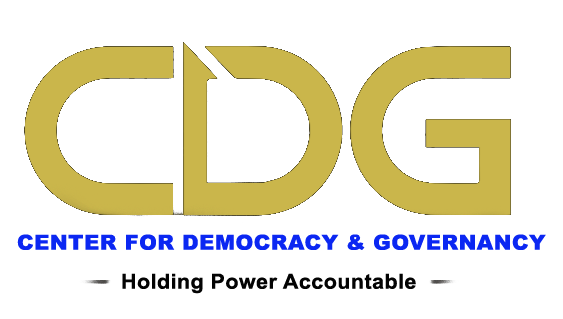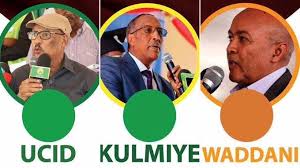FOR URGENT PRESS RELEASE 22-July,2020
Gororiye House, second Floor Room 5 and 6
Badda cas Area, off Jigjiga Yar
Hargeisa, Somaliland
+252-63-4425849
Contact person: Abdirahman Warsame
Position: Country Director
Email: country-director@cdgsomaliland.org or cdgsomaliland@gmail.com
FOR 30 YEARS AFTER CIVIL WAR THE ACADEMIC QUALIFICATION REQUIREMENTS FOR PARLIAMENT AND LOCAL COUNCILORS CRIPLES LEADERSHIP DECISIONS & SERVICE DELIVERY
Center for Democracy and Governance (CDG) has been looking and inspired by the trends taking place in institutional and legal capacitation of the administration in order to deliver to the promises made to transformation of the Somaliland people. The vision 2030 has super-strategic focus to economically, socially and politically move Somaliland to a modern democracy, transparent and action oriented. This judgement depends much on the values to achieve. However the legal framework and policies’ strategic actions are key determinants of which way and how we get there.
As you could be aware the applied definition of politics rests on the premise to manage society and delivery to the aims of the society. Political resilience contributes to societal resilience and achievement of stability, progress and rights of the people. The capacity of the policy makers to craft long term spanning laws is deemed to result in efficient implementation and effectiveness of performing public and private institution. Protection of the law lies in the efficiency of competent guardians of the law, patrons of social justice, political justice and economic justice. The big question in the capacity and governance debates is who are the next legislators???? Who are the next Local Council representatives and decision makers at regional levels??? It is less eminent but the competence reality is that legal injustices originate not in the courts of law or in the implementing dockets but in the legislation docket. We must take a strong focused review of the qualification for potential legislators at national and local level.
In the parliament and at local councils we elect and appoint committees to shape the mechanism of delivery of services, use of national assets, protection of national assets and most important of all these depend on the people elected to offices. In parliament and at local council the legislators interact with technical teams at planning, discussion and enacting rules and procedures, laws and process governing the achievement of national development and transformation of society. Time tested, well groomed and technically prepared legislators are result of the electoral law, constitutional structures and infrastructure, upon which the executive, legislature and judiciary are founded in service of the people.
As CDG like other civil society including citizens have been building national capacity in producing skilled men, women and minorities but if the electoral law does not openly set a strong ground for electing technically qualified people to the decision-making power houses, effective service delivery is jeopardized, and coordination as well as operation of systems created will fall short of standards set. Institutional collaboration which jointly harmonize and eliminated duplication and wastage are impossible and technical manipulation, corruption, and institutions become vulnerable to incompetency breeding from inappropriate laws on delays in making durable and useful laws suitable to development agenda of Somaliland. Planning and systems are naturally demanding using the country’s smart and well trained people in policy making seats across the country. Political parties must think about the technical direction and value of Somaliland when screening for parliament and technocrats positions.
Case posed against the election:
The electoral laws between 1998 and 2008 were adjusted to suit the existing and changing situations in Somaliland. Like the case is with making institutional and legal changes in many African and Muslim nations but circumstances have shifted education standards in electoral law standardization greatly affect delivery of services and development programs projects.
Many women and youth since 1991 were mobilized to ga to school in neighboring countries and in 2000 onward many universities were established the constitution of Somaliland (2001) article 15 upholds education of youth and all children and in the interest of all people of Somaliland as a path to social, economic and political development. This implying production of men and women that have advanced knowledge and skills to spearhead the country domestic and international development agenda. However the electoral law as it stands in the social and traditional context allowing local representative the most minimum requirement in a country where each year Degrees, masters and PhDs graduate locally and international education institutions is a blow to national development and international development partnership and technical development.
In article 15 sections (2), (4) and (5) the government has spread and put enabling condition to eradicate illiteracy but the electoral law frustrates the gains of education in building a human capital resource base that can stir national development by not providing for a minimum education compatible with the special environment needed in carrying out nation development planning, policy design, analysis thus inadequate capacity in local and sometimes in national/central agencies to frustrates the citizens by poor technical delivery of elected representatives.
Article 16 (3) and (4) government through the constitution is bound to promote knowledge and benefiting from knowledge of other world. Learning from many African countries and neighboring countries and considering the implementation of local government in Nigeria, South Africa, Kenya, Uganda, Ethiopia, south Sudan, Egypt decentralized power yields benefit to the citizen if their elected representatives have advanced education and academic qualification in technical fields and the technical staff at local district merit the responsibility and functions devolved.
The secondary school minimum requirement is demeaning to the hundreds of thousands of graduates who are ably training in management sciences, political science, natural resources management, agricultural and urban planning, policy formulation and analysis. It is high time that Somaliland parents and citizens who paid the taxes to provide for services including education to benefit from well-educated policy making by opening space for elites participate in elective politics. The election law review if not done Somaliland has a big challenge as we analyse in the section below.
Somaliland is blessed that in close to 30 year the first university to open its gates to university education is 20 year. As the country celebrates maturity, it is time to have it locally studied people engaged. 20 universities local and internationally founded each year graduate over 10000 first degrees, over 250-400 masters and close to 10000 diplomas. Unfortunately, these graduates remain in the back seats and the back yard of political decisions.
The election law: Challenges and recommendations for constitutional affairs.
Article 41 (4) provides for election candidacy and education criteria for house of representative to the firs legislative body sets a minimum at, at least secondary school. It never mentions the other education levels giving a lee way to getting the minimum in the country circumstances operating development at an advanced level in regard to programs design, project implementation and delivery to welfare of the citizens of Somaliland.
At international development partnership technical capacity, knowledge management and time tested/experienced decision making and policy remain done below the bar due to these disadvantages. If the traditional system fields it best on financial, corrupt basis and inappropriate candidates arise to the political parties tickets less of advanced policy knowledge development is crippled.
Challenges:
-The elite or Somaliland’s educated children remain less involved in politics and multi-party politics founded on financial muscle and payment of voters denies citizens leadership that can deliver from the knowledge side in local and national representation and legislation.
-The neighboring countries have district service commissions made of senior technical public servants screening technical staff to work in local districts and political parties have education standards in their constitutions to ensure technical capability is elected. Somaliland political parties must on this note consider voting educated members to elective position to deliver better and inform administration.
-Elites and academics are part of the civil society, but their political participation in political competition remains so docile, and that dormancy is affecting progress of the local development and public sector performance.
-Implementation of policies, policy and strategy formulation remains lower due to the local representative’s capacity which is incompatible with the technical capacity required or they work with. Technical guidance needed in local and higher house cannot be obtained with education minimum.
-Technical staff wherever they exist in districts and semi-autonomous departments and agencies are frustrated by elected representatives in the policy making which should be empowered. Public reforms are not sufficiently implemented and so transformation is slowed.
General recommendation:
-Clans in Somaliland are significant players in elections. So clan leaders are called upon through this forum to motivate educated clan members to join elective politics and deliver to the values for which the society demands from them.
-Clan leaders and political parties should encourage their educated party members to contest elective office and consolidate the achievements of the past 30 years.
-Political parties should hold urgent meetings to amend election rules and by-laws specifically the clause of election criteria on education qualification. And it is the requirement of the constitution of all citizen to respect and ensure the constitution values of every article enable national development.
-The National Electoral Commission of Somaliland should investigate in their vested mandate and power the biographical information of election candidates and require universities and National Council for Higher Education to set modalities, share information on authenticity of academic documents presented by election candidates.
-Political parties should hold forums to motivate their members on the value of electing technical people to positions of representation integrating academic qualification with tradition values in qualifying candidates.
-Political parties and traditional leaders have the responsibility to reshape the direction, guide the nation well in the quest to fit in international system of nations and for domestic development through capable leadership. Political parties should take a lead in changing the status quo, set political parties’ rules and procedures entrenching professionalism in political party activities and national activities. This will guarantee progress and national maturity and development of national resources.
THE END.

